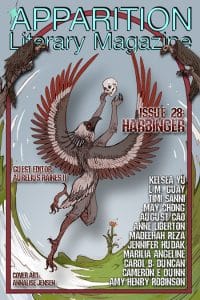 While the amazing editors of Apparition Lit were busy preparing our inaugural issue, I flew into Pittsburgh, PA for the first time and immediately lost feeling in both my hands. My journey to the MFA in Writing Popular Fiction residency at Seton Hill University began in negative thirty degree weather. I do not recommend existing in negative thirty degree weather.
While the amazing editors of Apparition Lit were busy preparing our inaugural issue, I flew into Pittsburgh, PA for the first time and immediately lost feeling in both my hands. My journey to the MFA in Writing Popular Fiction residency at Seton Hill University began in negative thirty degree weather. I do not recommend existing in negative thirty degree weather.
Once I arrived at the university, my hands had returned to normal but my anxiety had spiked. Confession– I’ve only ever done school online. I like working at my own pace, and as an introvert, interacting with other students is easier for me through text. Walking onto campus, I was transported sideways into high school, worried that I wouldn’t make any friends, while also stressing that I’d get a parking ticket.
I don’t like to say that my stress/worry was unfounded, because there are reasons for that stress/worry, but I can say that everyone I met and interacted with was lovely. I did make friends, and I did feel like I belonged in the program. I did not get a parking ticket. I only got lost once in the one-way, narrow streets of Greensburg.
The week passed in a blur of workshops and modules. The residency officially started on a Saturday and lasted through Wednesday night. By Monday, I’d completely lost sense of time/space and existed as a note taker floating bewilderedly through a void.
But would I recommend it? Yes. 100%.
I picked Seton Hill for many important reasons. Here are four of them:
- It’s a low-residency program with two one-week long residencies a year in January and June.
- During the semester, you’re assigned a mentor who provides feedback on your manuscript and essentially acts as an editor, testing your ability to follow through with revisions.
- Your thesis is your novel, which must be complete and polished by the end of the program.
- Writing Popular Fiction is all about genre. Each mentor/professor writes and reads genre. They’re all experts in multiple genres. They love romance and refuse to let anyone give it a bad rap. They’re enthusiastic about bringing a new spin to vampires. They’re open-minded. They will tell you when something isn’t working, but they’ll also tell you when something is.
The modules and workshops I attended were constructive and immediately opened my eyes to things I hadn’t known to consider before. I left with an overflowing mind but with a better understanding of plot structure, characterization, and synopsis writing, among other things. While the days were long (I was often on campus from nine in the morning to nine at night), it was worth it to be immersed in creativity and craft knowledge.
If you write SpecFic and are interested in a MFA program, I would recommend looking into Seton Hill. But MFAs, low residency or not, are more than often not an option for everyone. Check out Lit Reactor’s article on hacking the MFA. I also recommend borrowing a copy of Self-Editing for Fiction Writers from your local library. If you have any recommendations for craft books/continuing education for writers or thoughts on MFA programs, please share in the comments.
Image via Tacoma Tomilson, taken while resting between modules.





